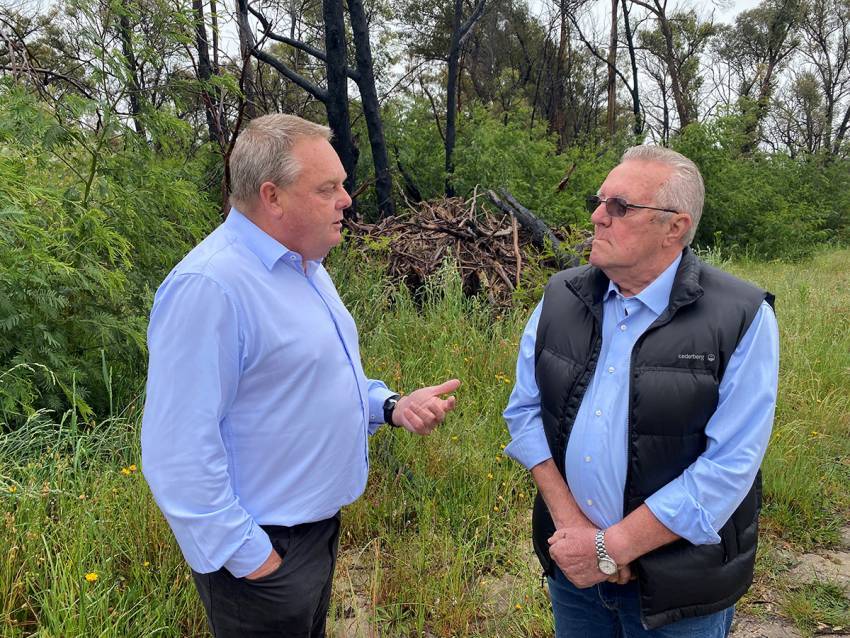The efforts to clear the black wattle infested roadsides post fires to lower future fire risk has reached a classic bureaucratic stand-off between Regional Roads Victoria (formerly VicRoads) and DELWP.
Despite repeated questions to the Minister and meetings and discussions, it is now clear the work that was commenced and then stopped – will not recommence any time soon.
The situation is this.
VicRoads Regional Roads Victoria was happy to do the work and in fact was doing the work via its contractors and a fine job they were doing. The community was happy and adjoining landowners were happy.
They were supportive as they saw first-hand during the 2019/20 fires that the overgrown roadsides acted as wicks. It was at the end of the drought and paddocks had no feed (fuel) and did not burn, but the fire ran along roadsides to connect to new areas of bushland where it took off again. Evidence of this could be seen clearly, especially around Gelantipy.
Clearing the roadsides made sense to all involved – it would assist in stopping the spread of fire and better protect adjoining properties.
The work was going swimmingly until a complaint was lodged that the work was impacting on roadside native vegetation. This is where the bureaucratic mess started.
The Conservation Regulator (an arm of DELWP) was called in and investigated on two fronts (1) allegations the work was resulting in wildlife habitat destruction, and (2) the work was resulting in unlawful vegetation clearance.
To country folk, the habitat destruction was pushing over burnt trees that would fall across fence lines and if they did not hit a fence would lay on the ground adding to fuel loads. The unlawful vegetation clearance related to native grasses.
The result of the Conservation Regulator’s investigation was Regional Roads Victoria (RRV) could continue its work provided it undertook the “required assessments and sought appropriate authorisations in order to continue with its roadside vegetation clearance activities, where it may impact on wildlife or species”.
RRV – and I do not blame them one bit – said it would do the work the community wanted, but said don’t make it hard for us – streamline the process for us to be able to deliver it without going through a bureaucratic minefield.
We need to remember these are road reserves – largely unmaintained – that resulted in the spread of fire last summer that would according to locals in some areas, would not have otherwise spread meaning less homes and private property would have been lost.
When it comes to road reserves in townships, we must have a layer of balance and common sense applied when it comes to human and community safety.
It must be put at the top of the list as a non-negotiable. If it could assist in saving lives and property, the work simply needs be done, no ifs or buts or bureaucratic red tape.
I am not talking about all roadsides region wide, but those in townships that have abutting private freehold.
As long-time residents of East Gippsland will know, it is not a case of if we have another fire, but when and if we do not maintain fuel loads in the bush, particularly on roadsides, we will suffer the consequences.
Greater fuel loads equal greater fire intensity and on roadsides, greater fire spread.
We now have this ridiculous anomaly where owners of private freehold are being told to clear their properties, when the abutting road reserve is a highly flammable black wattle, head high grass and debris infested jungle.
In our townships, we cannot put concerns about habitat trees and native grasses ahead of human safety – but that is what we are doing.
It is time for DELWP and RRV to get their collective heads together and work out how to get this work done – work our fire prone communities want done, rather than create hurdles and obstacles for each other.
Put on a cup of tea, sit down and don’t leave the room until you work out a way you can help each other reach a common-sense outcome to reduce our roadside fuel loads rather than send emails and letters back and forth to each other hindering each other.
I’d be happy to chair it, but the problem is there is an arm of DELWP that does not want this resolved as their priorities differ. I should point out this is not a reflection on all DELWP staff, many who agree with this sentiment and understand country life very well and are strong members of our community.
But it does apply to the small percentage who go straight to the highest echelons to raise their concerns to the detriment of community safety. They will have much to answer for.
Monday December 20, 2021



